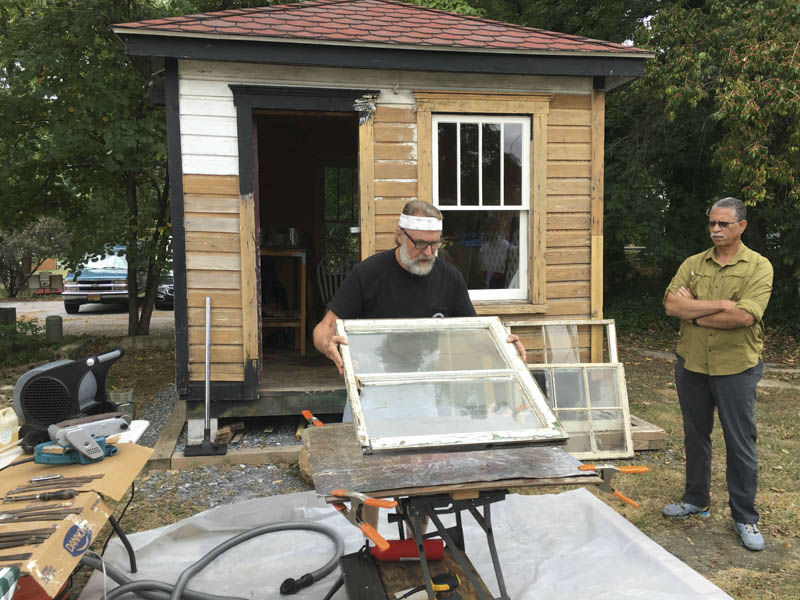This Presidents’ Day we’re exploring Maryland’s role in major moments in American presidential history as the host to the official presidential retreat, Camp David, tucked away in Catoctin Mountain Park in Frederick County.
ROOSEVELT’S RETREAT
The presidential retreat was founded in 1942 as a place of safety and respite for President Franklin Roosevelt. Roosevelt was fond of spending time on his yacht Potomac to get away from the bustle of life in Washington, DC. The Secret Service, however, became concerned that this was not a safe location because of the risk of German U-boat attacks.
Located nearby to DC, was the federally-owned land of Catoctin Mountain Park that was already improved during the 1930s as part of a project for the Works Progress Administration and Civilian Conservation Corps. Those improvements included large, rustic, log-built structures that were used as a recreation center for disabled children, charitble organizations, and also as a federal employee retreat.
Upon on his use of the retreat, Roosevelt named the camp Shangri-La, a phrase used by the author James Hilton in 1933 to describe a beautiful fictional landscape. The name did not stick and President Eisenhower, renamed the complex to Camp David in tribute to his father and son.
PROTECTING THE RETREAT
After World War II, President Truman decided the best thing to do with Shangri-La would be to preserve it as an official presidential retreat center. While the land is technically in the purview of the National Park Service, because of it’s association with the President and need for security the Park is staffed largely by Navy and Marine forces. Other portions of the area not to be used by the President were divided into the Catoctin Mountain Park and the Cunningham Falls State Park – both of those parks are accessible by the public. Along with the land, several dozen log structures built by the WPA are also protected as part of the Camp Misty Mount Historic District and Greentop Historic District.
CAMP DAVID IN USE
Camp David has played in important part in US foreign policy as a center for strategizing and negotiating with foreign leaders. FDR hosted Winston Churchill and other Allied leaders. The negotiations leading to the Camp David Accords, peace agreements struck between Israel’s Menachem Begin and Egypt’s Anwar Sadat, took place at the retreat under President Carter’s direction. The location has also served as a strategizing center for the Normandy Invasion, discussions between Eisenhower and Khrushchev, discussion of the infamous Bay of Pigs invasion and the Vietnam War, as well as a place of recovery for Marines injured in fighting at Iwo Jima and Okinawa.
NEIGHBORING THURMONT & THE COZY INN
The community surrounding Camp David and the protected parkland is the Town of Thurmont – a community with under 10,000 residents but known to history because of it’s proximity to the power of the President. Meetings held at Camp David brought dignitaries and cadres of people associated with their offices. Historically, many of those folks stayed at the Cozy Inn, a privately-owned hotel and restaurant the grew into a complex of gazebos, cabins, and meetings spaces.
- Douglas led a window workshop for Preservation Maryland at the Thurmont Historical Association, 2016.
Unfortunately, facing fewer patrons and development pressure, the Cozy Inn closed and was demolished in 2015. Some of the smaller cabins were saved and moved to alternate locations, including a ca. 1929 cabin being restored by the Thurmont Historical Society. Because of their dedicated work to preserve, restore, and interpret this unique piece of presidential history, Preservation Maryland presented the Thurmont Historical Society with a Community Choice award at the Best of Maryland event in 2016.
MORE MARYLAND PRESIDENTIAL HISTORY
- Washington resigned command of the Continental Army in the Maryland State House in 1783, paving way for him to be a president without military command.
- James Madison stayed in Brookeville in Montgomery County for a day, when he was forced to flee British forces attacking Washington in the War of 1812.
- Baltimore served as the US capital from 1776-1777 and Annapolis served as the capital from 1783-1784.
This post was researched and written by Kyle Fisher, one of Preservation Maryland’s former Waxter Interns. Kyle’s work with us focuses on research and communications. He has a BA in Communications and History from Virginia Tech and a MA in Social Studies Education from Loyola University Maryland. Learn more about Kyle and our intern program here: presmd.org/waxter.


